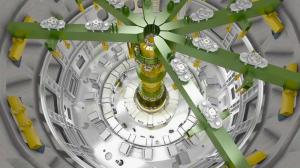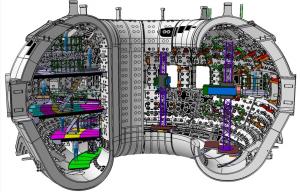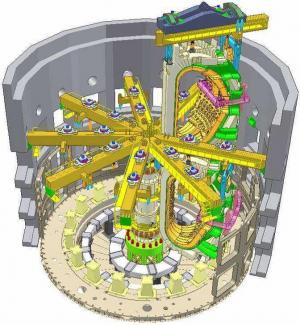ITER assembly: making plans today
When the starter pistol goes off for ITER assembly in the third quarter of 2014, a long and coordinated schedule of first-phase assembly activities will be set into motion—a schedule that begins with the installation of buried water pipes for the cooling water system and ends with First Plasma.
For the Tokamak alone, the schedule currently contains 40,000 lines.
The ITER Organization has the overall responsibility for all on-site assembly and installation activities, as well as testing and commissioning. "And not only for the ITER machine," emphasizes Ken Blackler, head of the Assembly & Operation Division, "but also for the site-wide installation of plant systems in 37 buildings, such as radio frequency heating, fuel cycle, cooling water and high voltage electrical systems—this is often not realized."
The Division's role will be one of engineering, planning and management—the assembly work itself will be done by industry. The team is working now on the specifications for a large number of mechanical, electrical and other construction contracts. The workforce reunited through these contracts will represent between 2,000 and 3,000 people.
"The major question for us today is: What must we be doing now to prepare for assembly?" says Ken. "We are still in the 'paper phase' this year; this is extremely critical in terms of schedule. The amount of preparation we do ahead of the game will guarantee that the real work will go well. What we do now, and how well we prepare, governs the future."
To manage the organization behind ITER assembly, the biggest challenge according to Ken, the team has divided the site into six "chunks," each one a separate assembly and commissioning project (the Tokamak is one project, for example; the high voltage power supply systems another...).
Line-by-line assembly procedures already exist for each critical ITER system or component—these are in the process of undergoing review by engineers from industry who are specialized in installation works: their role is to verify interfaces and ask the hard questions. Has enough space been reserved for the necessary tooling? Is there a "clear-and-free" assembly path? Can the requested tolerances be physically achieved? Will we be able to inspect, maintain, and eventually replace the components?
"Before assembly begins, our 40,000-line schedule for the Tokamak will be broken down even further by the construction contractor into a step-by-step instruction sheet—practically to the level of task-by-hour," says Ken. "Plans at that level of detail will be needed for each one of our assembly projects."
The assembly plan for each system or component is supported by a dedicated team comprised of Responsible Officers (ROs) from the Domestic Agencies, industry representatives and—from within ITER—ROs, contract managers, schedulers, and a cost controllers. When assembly begins, experts from the Domestic Agencies—where manufacturing has taken place—will be present on site. "If issues arise, as I'm sure they will, work stoppages could result which would cost money. So we will need to have the right experts on site with us capable of making fast decisions and solving these issues quickly."
The Division will work closely with industry during assembly. ITER has experts in Tokamak assembly, while industry will bring construction experience. Ken already foresees early morning meetings to review daily work plans. The current assembly plan is based on two full work shifts per day, with the night shift reserved for testing operations or preparation of the next day's activities (fetching components from storage, for example). A five-day work week during the assembly phase will be the norm according to Ken, but for some critical areas a sixth day will be necessary to adhere to the schedule.
Since arriving at ITER in 2008 to create the Assembly & Operations Division, Ken has built a strong team. "We have people who were involved in building and commissioning tokamaks like JET (EU), KSTAR (Korea) and the Indian machine SST-1, as well as CERN LHC, large telescopes and synchrotrons. But we also have engineers with nuclear, oil and chemical industrial experience that will be precious in a construction project like ITER."
"The complexity of ITER assembly is related to the number of projects, the number of systems, and number of actors involved," says Ken. "It is our job to reconcile all of that into a plan that will work."




